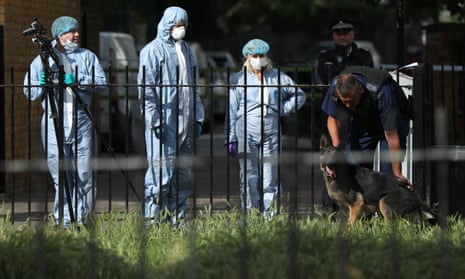People have an increasing chance of getting away with murder as figures show the number of detectives investigating the most serious offences in England and Wales has fallen by more than a quarter since austerity began.
Data obtained under freedom of information requests showed the number of detectives serving in major crime and murder squads had fallen by at least 610, or 28%, between 2010-11 and 2017-18.
During the same period the detection rates for homicide, which includes the suspected offences of murder and manslaughter, fell by more than 10%. The detection rate relates to the number of cases in which police believe they have identified the offenders.
Many factors affect crime outcomes, but one of the biggest has been the 19% cut in government funding since the Conservatives took power in 2010.
In 2010-11, 83% of homicides were solved. That figure had fallen to 74% by 2015-16 and 67% by 2017-18, according to official data.
One senior detective in a major urban force told the Guardian his team was dealing with double the number of homicides it should be.
“We have had so many years of under resourcing, it has a cumulative effect,” he said on condition of anonymity. “There have been occasions when my people have had no recovery periods. There is not one day where you have any slack to do non-urgent work.”
The detective said he was concerned about his officers’ wellbeing. “There isn’t that moment to take your foot off the accelerator, people are feeling tired and stressed.”
He pointed out that the cuts came at a time when serious crimes were becoming more difficult and demanding to investigate.
“Some of these jobs are really complex now and so need a lot of resources. I don’t think people appreciate how complex crime has become.”
In one recent case, he said, a single hour of CCTV footage took a fortnight to view and log: “Not every camera points in the right direction or has good quality pictures.”
There is a national shortage of detectives, partly because the job is seen as carrying higher levels of pressure and risk than uniform roles, and that it is not worth the reward.
Twenty out of 43 local forces in England and Wales replied to freedom of information requests from Labour’s policing spokeswoman, Louise Haigh, asking about the number of detectives in their major crime and homicide squads.
Haigh said the figures were chilling.
“Tory cuts to policing have not only left victims without justice, they’ve let murderers walk free, leaving our communities at risk,” she said.
“Everyone running to be Tory leader bears responsibility – they voted for these cuts or failed to speak out against them.”
A Home Office spokesperson said: “We recognise that demand on the police is changing and becoming more complex.
“This is why the government has increased funding for the police by more than £1bn in 2019-20, including council tax and funding to tackle serious violence. The funding is already enabling the police to recruit and fill key gaps, such as on detectives.
“Police forces are working with the College of Policing to ensure all forces have adequate numbers of qualified detectives now and in the future, and we are funding the development of the Police Now detective scheme to help bridge the gap.”
Jon Boutcher, a former chief constable of Bedfordshire said there were complex reasons behind the the falls, and that being a detective was no longer regarded as the desirable job it once was.
“The reduction in numbers … the change in complexity in what we are required to do, means that we can’t achieve the detection rates we once did because we don’t have the officers,” said Boutcher, who investigated high-profile terrorist attacks including the one on London’s transport system on 21 July 2005.
“A majority of detectives say they could not provide victims the service they want because of their caseload. Officers I expect to have five to 10 cases have 20 cases.”
John Apter, the chair of the Police Federation of England and Wales, which represents about 120,000 officers, said: “The numbers are really clear, it’s not rocket science to say there is a correlation. Our detectives, dealing with the more complex crimes, are fewer and far between.”
